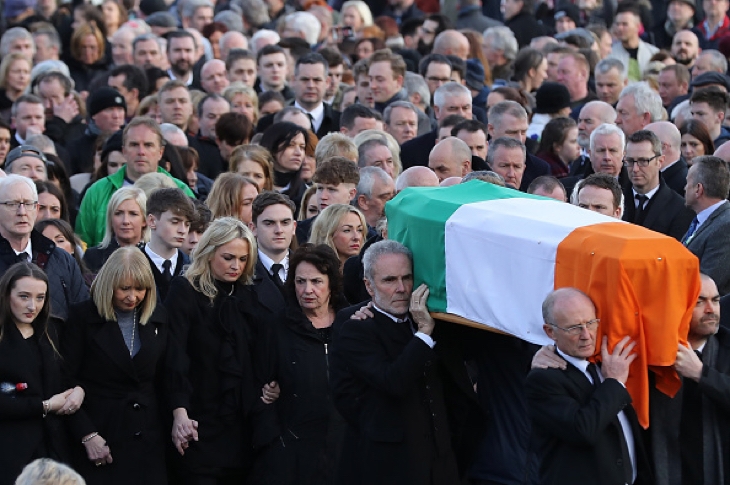Well, Sir Christopher Wren’s epitaph got an airing in St Columba’s church in Derry today for the funeral of Martin McGuinness. You remember: ‘Si monumentum requiris, circumspice,’ the monuments in question being the face of London. Well, Fr Michael Canny, who delivered the homily at McGuinness’s funeral in St Columba’s church, said that if people wanted to see a monument to Mr McGuinness they should look around them.
‘There are people in this church today whose presence would have been unthinkable only a generation ago,’ he said. ‘They have forged working relationships with Martin McGuinness; they have built friendships with him; they have occupied Stormont’s benches alongside him. Some have even sat in government with him.
‘The presence of those political rivals and opponents among you, who have come to pay their respects this afternoon, is the most eloquent testimony to the memory of Martin McGuinness. When you seek his monument, you – by your presence – are his monument.’
He was right, you know. Those attending included two former DUP leaders, Peter Robinson and Arlene Foster – neither of whom had an easy time of it during the Troubles. (It was unkindly observed of Peter Robinson during his marital difficulties that he felt safer with Martin McGuinness than with his own party loyalists.) Arelene was accompanied into the cathedral by the Catholic Bishop, John McKeown. And what bore out the truth of Fr Canny’s remark was that the two of them were, quite properly, applauded by the congregation.
It was an extraordinary, quite remarkable, turnout: James Brokenshire, Northern Ireland Secretary, obviously, but also poor John Hume, the former SDLP leader – the party was marginalised by Sinn Fein, the present head of the Police Service of Northern Ireland and the former head of the RUC in Derry during the Troubles, Peter Sheridan. This is, for anyone who remembers not just the Troubles, but the sectarianism that defined Northern Ireland until a generation ago, pretty well miraculous. I still don’t think we’re sufficiently astonished by and grateful for the peace that the Good Friday agreement brought; an agreement that couldn’t have worked without the active co-operation of both Republicans like Martin McGuinness, and his loyalist counterparts, whose record seems rather to have been forgotten by the critics of Mr McGuinness who surfaced since his death.
It can safely be predicted that there will be an ungenerous response from quite a few journalists — as well as, more understandably, relatives of IRA victims — to Bill Clinton’s attendance at the funeral and to his address, in which he told the congregation that he treasured every meeting with McGuinness and said that he ‘persevered and he prevailed, he risked the wrath of his comrades and rejection of his adversaries. If you really came here to celebrate his life and honour the contribution of the last chapter of it, you have to finish his work.’ That was a useful observation; it doesn’t, I think, amount to exculpating Mr McGuinness for his sins or diminishing their significance but it does direct the goodwill evident at the funeral firmly towards the future.
As it happens, my own sympathies during the Troubles were with the likes of nationalists like Gerry Fitt and John Hume, rather than with full blooded Republicans; contemporary Sinn Fein, in its current feminist, green, anti-clerical, anti-austerity manifestation is, as far as I’m concerned, even less attractive than the old republican version.
But what I found repellent about much of the coverage of Martin McGuinness in the Mail et al was the entire failure to put his career in context. You looked in vain for any mention of the sheer sectarianism that characterised the Northern Ireland in which he grew up; it was that which created a Republican. The reason why he became a (animal) butcher rather than a garage mechanic was religious discrimination; he maintained he joined the IRA following a police baton charge against a peaceful civil rights march in which his father took part. This is not to equate understanding Martin McGuinness with condoning the actions he was complicit in; but not to engage with the environment that created him (as well as those who took a different path) is wilful, culpable, political astigmatism.
But Charles Moore and his other critics should take heart from another part of Fr Canny’s sermon. ‘Martin, too,’ he said, ‘[like St Paul] has finished the race. He, too, kept the faith. He, too, has come face to face with the righteous judge who judges all fairly.’ In short, God will have the final say on Martin McGuinness.
PS. Meanwhile, the rest of us can ponder the nature of contemporary terrorism as reflected in the actions of the Isis sympathiser, Khalid Masood. My own view is that Martin McGuinness in the Seventies wouldn’t have had the smallest compunction about authorising the killing of a policeman outside the Houses of Parliament (though it would have been a bomb or a bullet, not a stabbing) but I simply cannot see the IRA, at any point in the Troubles, ploughing through pedestrians crossing Westminster Bridge. Then again, the IRA never went in for the suicide bombing business either; they were terrorists, but they were a more rational class of terrorist. Weird, isn’t it?







Comments